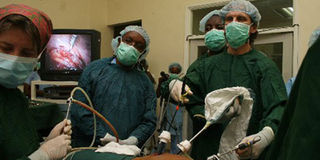Premium
The agony of a kidney failure in Kenya

Doctors conduct a kidney transplant at Kenyatta National Hospital. Such a procedure can cost up to Sh500,000 at the hospital. Photo/FILE
Mr Stephen Githinji holds a reputation that he wishes he does not. Having suffered kidney failure 23 years ago, he is one of Kenya’s longest serving patients on dialysis.
He still hopes to receive a kidney transplant one day. “What is the cost of life? There is no cost so expensive for me to remain alive,” he says.
His ordeal started in January 1988. After a series of tests, doctors at Kenyatta National Hospital told him that he had kidney failure and that he needed to get a kidney transplant.
Then, he was working at Barclay’s Bank as a clerical officer in Nairobi. Life was good for the 28-year-old young man then.
“When I was diagnosed, it took me by shock because I did not know what it entailed to be a kidney patient. I thought that this could be the beginning of the end for my young life,” says Mr Githinji, who has seen his body deteriorate over a period of years.
He explains that over time and with proper knowledge on the disease, he realized that he could fight the disease by getting a kidney transplant.
However, problems always come in pairs. In 1994, after undergoing dialysis for six years, the father of two teenage daughters was laid off work on medical grounds.
“My job had been sustaining me by paying for my dialysis at Nairobi Hospital. For three years, I used to pay Sh14,000 for two dialysis sessions per week. The other years at Kenyatta Hospital, I would pay Sh9,000 for the two dialysis,” he says.
Life has taken a downward spiral for Mr Githinji since losing his job. “It is a terrible life I am going through. I am now relying on well wishers for my medical fees. Over the years, it has accumulated to millions of shillings.”
Sadly, though, there are many other Kenyans in Mr Githinji’s situation. Though there are no figures on the situation in Kenya today, Dr Antony Were, a kidney specialist and the head of the renal unit at KNH, says there is a definite upsurge in numbers.
“We receive many patients with kidney failure in the hospital. These are only those who can afford to go through the tests and, subsequently, through dialysis,” says Dr Were. “However, there are many others who die in the periphery units and in provincial hospitals.”
According to Mrs Jean Banda the director of Kenya Kidney and Lupus Foundation (KKLF), there is need for increased awareness as a means to manage and even reduce the increasing cases.
Mrs Banda says the cost of treatment for kidney failure to a common man is prohibitive. Many have surrendered and died because they could not support the cost of medication.
It costs Sh60,000 per month to undergo dialysis at Kenyatta hospital. The same process costs Sh100,000 per month in private city hospitals.
A kidney transplant costs up to Sh500,000 at Kenyatta hospital while it costs not less than Sh1 million in private hospitals.
Even after a transplant, a patient has to take expensive anti-rejection drugs for the rest of their lives. These cost between Sh30,000 and Sh60,000 per month, for as long as they live.
It is recommended that a patient undergoes dialysis three times a week. However, due to high costs, many opt to do it twice a week. Each session costs Sh4,500 at Kenyatta, or Sh9,500 in private hospitals.
Mr Githinji has spent over Sh12 million on dialysis and medication, which has seen him sell off all his property, including a house along Juja Road and plots in Ruai.
Mr Twahir Ahmed, a kidney specialist at Parklands Medical Centre, says high blood pressure, diabetes and urinary tract infections are the highest causes of kidney failure.
Mrs Banda says one of the biggest worries for kidney patients is getting a donor for the transplant. She says the country needs to have a policy allowing the harvest of body organs.
Kidney treatment is mostly available to Kenyans living in Nairobi. “At the moment the services are concentrated only here in Nairobi and at the Eldoret Teaching and Referral Hospital, so one has to come and camp here in Nairobi,” says Mrs Banda, herself a former kidney patient.
“The government should decentralise the dialysis services to regional hospitals rather.” Of interest is that insurance companies do not provide cover to patients with kidney problems in the country.
Mrs Banda, who spent over six years on the expensive dialysis, argues that the insurance companies view kidney patients as high risk customers.
“I wish it was possible for the insurance companies to charge slightly higher than other covers.” “Many families have been left destitute by the disease because patients tend to consume a lot of the families’ resources. Some are forced to move to Nairobi to be close to medical facilities,” says Mrs Banda.




